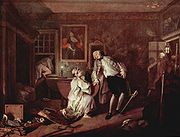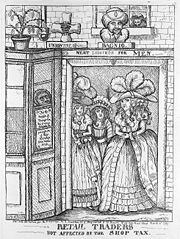
Bagnio
Encyclopedia
A Bagnio was originally a bath
or bath-house
.
The term was then used to name the prison for hostages in Istanbul
, which was near the bath-house, and thereafter all the slave
prisons in the Ottoman Empire
and the Barbary regencies. In the Barbary prisons, the hostages of the pirates spent their nights there, leaving during the day to work as laborers, galley slave
s, or domestic servants.
Bagne became the French word for the prisons of the galley slaves in the French Navy
. The last one in European France (Toulon
) was closed in 1873. The communication between master and slave and between slaves of different origins was made in Lingua Franca (also known as Sabir), a Mediterranean pidgin
with Romance and Arabic
lexicon. The French penal colony on the Îles du Salut
was also called Bagno, and features in the famous bestseller Papillon
.

 In England, it was originally used to name coffee houses which offered Turkish baths, but by 1740 it signified a place where rooms could be hired with no questions asked, later a house of prostitution.
In England, it was originally used to name coffee houses which offered Turkish baths, but by 1740 it signified a place where rooms could be hired with no questions asked, later a house of prostitution.
about the life of the caitiff
s. Cervantes himself had been imprisoned in Algiers
(1575–1580). His Don Quixote also features a subplot with the story of a caitiff (chapters 39-41 of the first part). In The Day of the Locust
, (Nathanael West
, 1939), Claude Estee's wife, Alice, says "Nothing like a good bagnio to set a fellow up." A bagnio, in reference to a brothel
or boarding house, is also mentioned in The Private Memoirs and Confessions of a Justified Sinner
by James Hogg
as the location of a quarrel between two young Edinburgh
nobleman that precedes one of them being murdered and the other arrested for the crime.
Bathing
Bathing is the washing or cleansing of the body in a fluid, usually water or an aqueous solution. It may be practised for personal hygiene, religious ritual or therapeutic purposes or as a recreational activity....
or bath-house
Public bathing
Public baths originated from a communal need for cleanliness. The term public may confuse some people, as some types of public baths are restricted depending on membership, gender, religious affiliation, or other reasons. As societies have changed, public baths have been replaced as private bathing...
.
The term was then used to name the prison for hostages in Istanbul
Istanbul
Istanbul , historically known as Byzantium and Constantinople , is the largest city of Turkey. Istanbul metropolitan province had 13.26 million people living in it as of December, 2010, which is 18% of Turkey's population and the 3rd largest metropolitan area in Europe after London and...
, which was near the bath-house, and thereafter all the slave
Slavery
Slavery is a system under which people are treated as property to be bought and sold, and are forced to work. Slaves can be held against their will from the time of their capture, purchase or birth, and deprived of the right to leave, to refuse to work, or to demand compensation...
prisons in the Ottoman Empire
Ottoman Empire
The Ottoman EmpireIt was usually referred to as the "Ottoman Empire", the "Turkish Empire", the "Ottoman Caliphate" or more commonly "Turkey" by its contemporaries...
and the Barbary regencies. In the Barbary prisons, the hostages of the pirates spent their nights there, leaving during the day to work as laborers, galley slave
Galley slave
A galley slave was a slave rowing in a galley. The expression has two distinct meanings: it can refer either to a convicted criminal sentenced to work at the oar , or to a kind of human chattel, often a prisoner of war, assigned to his duty of rowing.-Antiquity:Contrary to the popular image of the...
s, or domestic servants.
Bagne became the French word for the prisons of the galley slaves in the French Navy
French Navy
The French Navy, officially the Marine nationale and often called La Royale is the maritime arm of the French military. It includes a full range of fighting vessels, from patrol boats to a nuclear powered aircraft carrier and 10 nuclear-powered submarines, four of which are capable of launching...
. The last one in European France (Toulon
Toulon
Toulon is a town in southern France and a large military harbor on the Mediterranean coast, with a major French naval base. Located in the Provence-Alpes-Côte-d'Azur region, Toulon is the capital of the Var department in the former province of Provence....
) was closed in 1873. The communication between master and slave and between slaves of different origins was made in Lingua Franca (also known as Sabir), a Mediterranean pidgin
Pidgin
A pidgin , or pidgin language, is a simplified language that develops as a means of communication between two or more groups that do not have a language in common. It is most commonly employed in situations such as trade, or where both groups speak languages different from the language of the...
with Romance and Arabic
Arabic language
Arabic is a name applied to the descendants of the Classical Arabic language of the 6th century AD, used most prominently in the Quran, the Islamic Holy Book...
lexicon. The French penal colony on the Îles du Salut
Îles du Salut
The Îles du Salut are a group of small islands of volcanic origin about 11 km off the coast of French Guiana in the Atlantic Ocean...
was also called Bagno, and features in the famous bestseller Papillon
Papillon (autobiography)
Papillon is a memoir by convicted felon and fugitive Henri Charrière, first published in France in 1969. It became an instant bestseller. It was translated into English from the original French by June P. Wilson and Walter B. Michaels for a 1970 edition, and by author Patrick O'Brian...
.


In fiction
Los tratos de Argel ("The trades of Algiers", 1580), Los baños de Argel ("The Bagnios of Algiers", 1615), El gallardo español ("The Gallard Spaniard", 1615) and La gran sultana ("The great sultaness", 1615) were four comedies by Miguel de CervantesMiguel de Cervantes
Miguel de Cervantes Saavedra was a Spanish novelist, poet, and playwright. His magnum opus, Don Quixote, considered the first modern novel, is a classic of Western literature, and is regarded amongst the best works of fiction ever written...
about the life of the caitiff
Caitiff
Caitiff may mean:* a galley-slave in a Barbary bagnio* a Camarilla clanless character in Caitiff * A bandit in the Kingdom of Wu, pacified by generals such as Zhou Tai...
s. Cervantes himself had been imprisoned in Algiers
Algiers
' is the capital and largest city of Algeria. According to the 1998 census, the population of the city proper was 1,519,570 and that of the urban agglomeration was 2,135,630. In 2009, the population was about 3,500,000...
(1575–1580). His Don Quixote also features a subplot with the story of a caitiff (chapters 39-41 of the first part). In The Day of the Locust
The Day of the Locust
The Day of the Locust is a 1939 novel by American author Nathanael West, set in Hollywood, California during the Great Depression, its overarching themes deal with the alienation and desperation of a broad group of odd individuals who exist at the fringes of the Hollywood movie industry.In 1998,...
, (Nathanael West
Nathanael West
Nathanael West was a US author, screenwriter and satirist.- Early life :...
, 1939), Claude Estee's wife, Alice, says "Nothing like a good bagnio to set a fellow up." A bagnio, in reference to a brothel
Brothel
Brothels are business establishments where patrons can engage in sexual activities with prostitutes. Brothels are known under a variety of names, including bordello, cathouse, knocking shop, whorehouse, strumpet house, sporting house, house of ill repute, house of prostitution, and bawdy house...
or boarding house, is also mentioned in The Private Memoirs and Confessions of a Justified Sinner
The Private Memoirs and Confessions of a Justified Sinner
The Private Memoirs and Confessions of a Justified Sinner, is a novel that was written by the Scottish author James Hogg and published anonymously in...
by James Hogg
James Hogg
James Hogg was a Scottish poet and novelist who wrote in both Scots and English.-Early life:James Hogg was born in a small farm near Ettrick, Scotland in 1770 and was baptized there on 9 December, his actual date of birth having never been recorded...
as the location of a quarrel between two young Edinburgh
Edinburgh
Edinburgh is the capital city of Scotland, the second largest city in Scotland, and the eighth most populous in the United Kingdom. The City of Edinburgh Council governs one of Scotland's 32 local government council areas. The council area includes urban Edinburgh and a rural area...
nobleman that precedes one of them being murdered and the other arrested for the crime.

